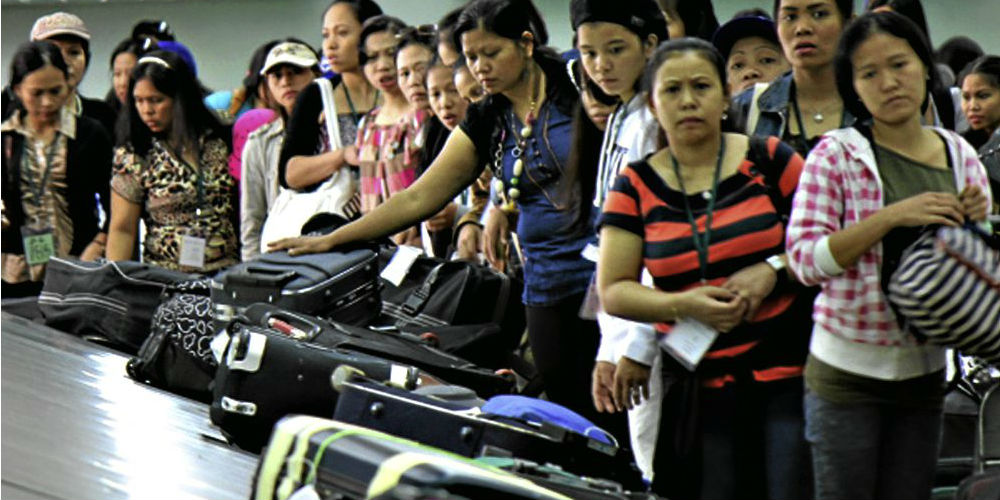Top government officials on Tuesday welcomed 282 overseas Filipino workers (OFWs) fleeing the civil war in Syria.
It was the biggest single repatriation negotiated between the two governments since the Philippines raised a mandatory evacuation alert in December last year in response to escalating violence in the Middle Eastern state.
Over 3,000 OFWs, however, have apparently chosen to stay in Syria.
Vice President Jejomar Binay, Foreign Secretary Albert del Rosario and Overseas Workers Welfare Administration (Owwa) Chief Carmelita Dimzon welcomed in the morning a batch of 263 OFWs at the Ninoy Aquino International Airport (Naia) on board Jordan Aviation flight JAV-4371 chartered by the Switzerland-based International Organization for Migration. A second batch of 19 OFWs arrived later in the afternoon on board an Emitates Airways flight.
Syria survivors
The OFWs erupted into cheers after entering the Naia holding area. Some held up a large handmade placard which said “Syria OFW Survivor.”
Most of them were female domestics who went to Syria despite a work ban imposed by the Philippine government. They are considered “illegals” in the Philippines although many of them have legal work contracts in Syria.
Binay said the “undocumented” OFWs are still considered “victims of human trafficking” and the circumstances of their deployment were being investigated by the government’s Inter-Agency Council Against Trafficking.
The returnees said they were happy to be back. “We were losing hope about being able to leave Syria. It’s scary [in my employer’s house] because there’s gunfire and explosions everyday, especially at night,” said one of the OFWs, who said she originally came from Lebanon.
Happy to be home
“Despite the hardships we endured, we are happy because we will be seeing our families at last,” added her companion.
The batch included some who had runaway from their employers, complaining of maltreatment and labor rights violations.
The returnees had been sheltered at the Philippine Embassy for months but were unable to leave because of noncompletion of exit requirements, such as employers’ clearances and immigration fines and penalties.
The embassy said it experienced difficulties negotiating with the OFWs’ employers, some of whom they were unable to find while others resisted letting their domestic workers leave due to unfinished service contracts.
Del Rosario visited Syria last week to request waivers of the exit visas, negotiations with employers and payment of immigration penalties. This was granted by Syrian President Bashar Assad through Foreign Minister Walid al-Muallem.
When asked if the OFWs were exposed to immediate danger in the ongoing civil war in Syria, Del Rosario replied, “Damascus is fairly normal; it’s business as usual during the daytime. In the evenings you can hear occasional explosions. The escalating violence is happening in the provinces, such as Aleppo, Homs and Daraa, which are under siege. Our people are coming [to the embassy] from all over Syria.”
Stress debriefing
Owwa’s Dimzon said the OFWs will be sent to the agency’s halfway house for “stress debriefing.” She said the OFWs would also be given free transportation to their homes.
Binay, who is concurrently the presidential adviser on OFW affairs, said the workers from Syria, even if they were “illegals,” could avail of benefits from the government’s reintegration program such as loans, skills training, setting up of small businesses.
Work not yet over
Binay also appealed to the OFWs remaining in Syria to enlist and be repatriated, saying there were still thousands of Filipinos in the conflict-stricken country.
“Our work is not yet over as there are still thousands of Filipinos still remaining there. I hope that those who are still there would leave now because the situation is getting worse,” Binay said.
He noted that the Philippine government was contacting international agencies to assist in the repatriation reports.
Binay also asked the help of the OFWs who had been repatriated to give “complete and accurate information” about their stay in Syria, and how they were able to leave the Philippines despite the departure ban.
“This will help in gathering knowledge about the possible location of Filipinos still left behind, as well as in the government’s drive to stop human trafficking and illegal recruitment,” Binay said. With a report from Fatima Reyes, INQUIRER.net
